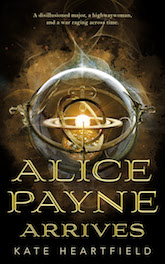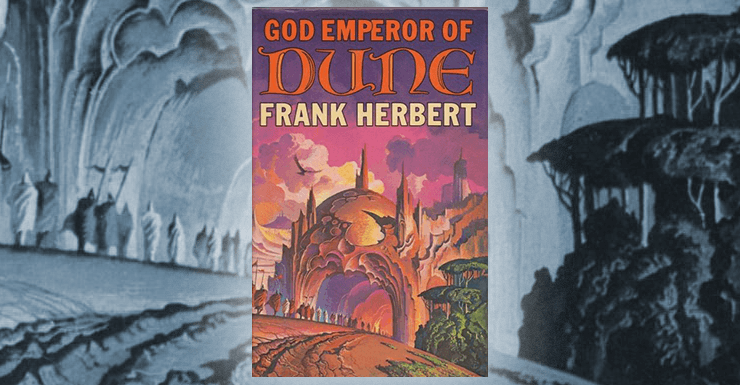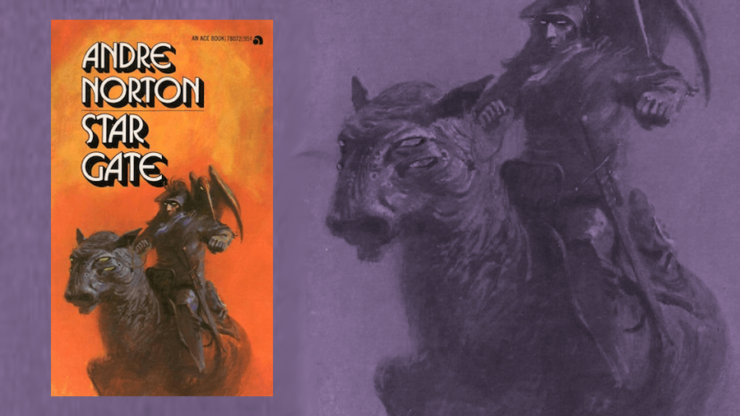Jo Walton once wrote, fairly, that each of Frank Herbert’s Dune novels is about half as good as the one before it. By my math, that makes God Emperor of Dune (#4) about 12.5% of a classic, but it’s still worth reading.
It presents an argument that I think is fundamentally misguided, but it’s worth reading.
It’s about the ruminations of a man who turns into a worm, but it’s worth reading.
I know it’s worth reading because I’m still thinking about it three decades after the first time I read it.
The worm in question is Leto Atreides. He’s the son of Paul Atreides, the protagonist of Dune. Like his father, Leto has the gift (or curse) of prescience, and of awareness of the memories of all his ancestors.
The Dune books begin in the far future of humanity, when Earth’s culture is barely remembered, and they span a long period after that.
God Emperor takes place 3,500 years after Paul Atreides won a family feud, became emperor of the known universe and reluctantly unleashed a violent “jihad” his prescience told him was necessary. After his father’s death, Leto makes a decision guided by that same vision of the future: he gradually becomes a sandworm, one of the giant creatures that make Dune a dangerous place to visit. This transformation makes him nearly invulnerable to attack and greatly extends his life.
Like Walton, I was about 12 the first time I read Frank Herbert’s Dune novels. My older sister’s boyfriend told me about them and lent me his battered paperbacks. (Be warned, teens of the world: The younger brats who borrow your books may be the science fiction writers of the future. Lend wisely.)
I read them all, back to back, and then I read them again.
Contrary to the stereotype, many teenagers think about the future a lot. It is, after all, the stage when you’re meant to decide the main course of the rest of your life. For an earnest, politically-minded kid, that translates into: How will I serve humanity? Can an individual even make a lasting difference?
God Emperor of Dune gave me one resounding, booming version of yes, in response to that question. It’s taken me a few decades to figure out precisely why it’s such a bad yes, but that in itself is useful. It’s an entire series of books about What Not to Do.
Indeed, there’s plenty of evidence that Frank Herbert intended the books to be a cautionary tale. In 1982, he told Bryant Gumbel on NBC that his message was “Don’t trust leaders to always be right.” Herbert’s prescient tyrants—Paul and Leto Atreides—use their own charisma and humanity’s history of messianic religion to create unspeakable horrors.
But the reading of the original six Dune books simply as a cautionary tale doesn’t sit easily with me. Whether or not that’s what Herbert intended, it doesn’t fit the experience of reading the books, which are not didactic, or at least not in that way. Paul and Leto are, for the first four books, the protagonists. And they are sympathetic ones. The first four books aren’t about how humanity reacts to tyrants; they’re about why tyrants believe it is necessary to become tyrants.
God Emperor is dominated by Leto’s perspective. It shows us his Golden Path, his vision of a future in which humanity survives because Leto is willing to manipulate it into a period of suffering first. Leto’s oppressive regime, and its aftermath, is the only way to ensure that humanity reacts in a way that makes it harder to oppress. And the design of Leto’s prescient eugenics program is to create humans who will be invisible to future prescients. The means and the avoided ends differ only in that the former are meant to be, ultimately, temporary.
There is no escaping Leto’s vision. The people in God Emperor who think they’re rebelling against him are actually serving his goals. When the emperor is both functionally omnipotent and prescient, if you’re alive and resisting, it’s because he wants you alive and resisting. Resistance is worse than futile; resistance is inherently co-opted.
Like many tyrants, Paul and Leto believe the horrors they unleash are all for humanity’s own good. This is familiar: Many a strongman has come to power by convincing people he’s the alternative to worse horrors. Herbert doesn’t portray their worldview uncritically, by any means, but he does portray it with a great deal of sympathy. After all, Paul and Leto do what they do because they know what few others do. They see the obligation to play the bad cop as a burden they must bear. Leto believes he is the war to end all wars.
Herbert was writing in the latter half of the 20th century, when humanity had just created a new set of international, liberal-democratic institutions in direct response to the two world wars. It really did seem, when I was a teenager reading these books, that human history was moving in a certain direction. That it had an arc.
And one certainly gets the impression that Herbert thought that humanity had to learn its lessons somehow. Later in that same NBC interview, he said half-jokingly that his favorite president was Richard Nixon, “because he taught us to distrust government.”
Or, as Leto says to a rebel, “You hate the predator’s necessary cruelty.”
It’s that word necessary that’s all kind of wrong. I don’t know whether Herbert believed it was wrong, but I sure do.
A sole, horrific path to survival is a staple of science fictional story-telling. In Marvel’s Infinity War movie, it’s a motivation for both the bad guy and at least one (prescient) good guy: the idea that there’s only one solution, so its cost must be paid. This set-up appeals to story-tellers: It puts humanity in a giant arena like the one in Frank R. Stockton’s story “The Lady, or the Tiger?”. In this arena, there are infinite tiger doors and only one lady door. One way to survive, and many ways to die.
I can’t argue with a hypothetical God Emperor who can see the outcomes of all things. But I do know that a Golden Path is not actually how we are going to save the real world. The future survival of humanity is not a puzzle to be solved. There can be no single solution, no lone tipping point, because the future is the ultimate wicked problem.
The term “wicked problem” arose in social science in the late 1960s, roughly simultaneous with the publication of the first two Dune books. In 1973, the journal Policy Sciences published a paper by Horst W.J. Rittel and Melvin M. Webber called “Dilemmas in a General Theory of Planning.” It defines the characteristics of wicked problems. Such problems are not wicked in the sense of malicious, but they are, to borrow a phrase from C.S. Lewis, not tame lions. (The paper actually compares wicked problems to lions, and, charmingly, to leprechauns.)
Rittel and Webber noted that the rise of professionalism in modern social science seemed to inspire both faith and fear. “Many Americans seem to believe both that we can perfect future history—that we can deliberately shape future outcomes to accord with our wishes—and that there will be no future history,” wrote Rittel and Webber. “To them, planning for large social systems has proved to be impossible without loss of liberty and equity. Hence, for them the ultimate goal of planning should be anarchy, because it should aim at the elimination of government over others.”
This could easily be a thematic summary of God Emperor of Dune, which would be published eight years later.
Buy the Book


Alice Payne Arrives
The paper goes on to posit that we cannot “solve” social problems, in any definitive sense. Even the act of defining a problem, of setting a goal, can’t be separated from the act of addressing the problem. Solutions to wicked problems are not true/false; they are good/bad, and they are never good enough. A wicked problem is both fundamentally unique and connected to other problems. Every action has repercussions that cannot be foreseen, not even with vast amounts of data and computers to analyze that data. (Even Leto’s prescience has its limits, by his own design.) “The planner who works with open systems is caught up in the ambiguity of their causal webs.” Wicked problems are not just bigger or badder than tame problems; they cannot be addressed by the same methods.
Many smart people have devoted many words since 1973 to refining and refuting Rittel’s and Webber’s argument, and debating how we understand and solve complex social problems, especially when it comes to climate change, the wicked problem par excellence.
The theory of wicked problems doesn’t mean, of course, that policy-makers can’t examine evidence and act on it. It does mean that waiting for a Great Intelligence to show us the one door that doesn’t lead to a tiger is a false and dangerous hope.
It’s tempting to think, like Tom Stoppard’s version of Rosencrantz and Guildenstern, that “there must have been a moment.” A single moment, when we could have made a choice, and a better future could have been secured. Circa 1998, perhaps? Or perhaps earlier, before the bloody 20th century began? Earlier still, before the ravaging atrocities of colonial empires? But the truth is both more terrifying and more hopeful: the truth is that both the future and the past are made entirely of those moments. This is one of those moments right now, as you’re reading this.
Saving the world is not a yes or no proposition. We’re all saving the world to some degree every day, and destroying it to some degree every day. Even an action as seemingly binary and discrete as diverting an asteroid from its path depends on many decisions long before that point in many different systems, and it creates repercussions, some of which are far in the future and can’t be foreseen. Saving humanity is a good thing, but it’s never a simple thing, and it can’t be crossed off a to-do list, by a giant worm or by anyone else.
I can’t say whether I would have majored in political science, had I not read God Emperor of Dune. I can’t say whether I would have written books about a war between rival sets of time travelers bent on shaping the future. I do know that Herbert’s novel, as frustrating and disturbing as it is, caused ripples of consequence in my own little life, and is causing them still.
Kate Heartfield’s time-travel novella, Alice Payne Arrives, is available now from Tor.com Publishing, to be followed by a sequel in March. She is also the author of the historical fantasy novel Armed in Her Fashion (CZP) and the novella The Course of True Love (Abaddon). Kate’s interactive novel, The Road to Canterbury, is available from Choice of Games. She is a former journalist and lives in Ottawa, Canada.















Thanks for this. Thought-provoking. Your comments remind me of ST:Voyager’s “Year of Hell” two-parter, which IIRC actually involved the deflection of an asteroid at one point, so you may have been thinking of this as well.
Not to mention Dr. Manhattan’s terrific last line from Watchmen: “In the end? Nothing ends, Adrian. Nothing ever ends.”
S
I’m a big fan of this fourth book; I’ve long thought it’s the first one I’ll re-read if I go back to Dune. I wasn’t pleased at all with the treatment of Leto and his Golden Path in ‘Hunters’ & ‘Sandworms’, the supposed series conclusion.
It’s been 20+ years since I read the entire Dune series twice, and this has always been my favorite of the six.
It’s also (as far as I’m aware) the only Dune book to inspire an episode of The Grim Adventures of Billy & Mandy.
https://www.youtube.com/watch?v=qmw05oft94M
I first read the original Dune series when I was 19, and this one I didn’t care much for. It seemed dull and repetitive—basically the many deaths of Duncan Idaho.
Then I reread the whole series a decade later, and “God Empero was nothing like I remembered, and became a favorite, while “Dune Messiah” seemed more like pointless filler.
Thank you for the link to the wicked problems article. Sprightly humor couched in deep academeese, but I guess you have to have a sense of humor to tolerate the idea that there is no absolute definition of Good. There are a lot of humorless people having shouting matches over their respective definitions of Good. Some of the louder ones seem to be leaning toward “kill everyone who disagrees with me” as a way to arrive at a universal definition. Mathematically speaking, that is a trivial and uninteresting solution. When dealing with wicked problems, there is no one right answer, and the results of acting as if there is are often horrific.
As a teen, I read the Dune trilogy several times, so I was eager to read God Emperor. Sadly, I found it achingly dull, with virtually no story progress, until the last chapter.
I assumed it was too sophisticated for a teenager, and put it away.
I reread the book as an adult and sadly, again, it was no better. Dull, overstuffed, and self-indulgent.
This is an excellent piece on the good side of the Dune books.
But I just have a whole bag of bones to pick with them. I basically agree with everything Jo Walton says in her brilliant essay, with the caveat that, IMHO, only the first book is worth the trouble at all –the rest are incomprehensible, endless bloviating. Frank Herbert is the Victor Hugo of SF: over-hyped, over-bloated, rambling to the point of incoherence, self-indulgent to the max, as purple as the whole College of Cardinals, and with the most cavalier disregard for anything remotely resembling logic.
Take the problem of Alia, for instance. If Paul, as Kwisatz Haderach, is the ONLY ONE who has access to both the male and female lines of race memory, then how come Alia also has access to them? She is supposedly possessed by the genetic ghost of Baron Vladimir Harkonnen, but How. The. Fracking. Hell. Did. He. Get. There? WHAT’S WRONG WITH THIS PICTURE?
P.S. Walton sublimely deflates the whole race memory rigmarole: “if you had race memory of all your ancestors through your genes, that would give you their memory up to the time they conceived their child, not their wisdom in old age and experience, but a whole pile of twenty year olds.”
P.P.S. No offense, Dune fans; this is nothing but MHO.
I can hardly put into words how impressed I am with this article. This is the kind of top-shelf social analysis of science fiction I always dreamed of but could never find. I will have to do something with this information
I have nothing intelligent to add. Just wanted to say, this is a great article!
When I was very young c. 7/8 years I started on Dune but had to put it aside as I just could not “get” what was happening. As a teenager I tried again and realised just how amazing it was and That Messiah and Children, whilst not as good were important works. However I found the second trilogy dull (I even call God Emperor “God Awful of Dune”) and thought Chapterhouse was the only one worth reading.
Some years ago I re-read the whole serious and then understood how misguided I was and that whilst long and a bit bloated God Emperor and Heretics were attempts at getting across a serious message, whilst Chapterhouse was weak and indifferent.
I will re-read the whole series again someday and look forward to changing my view on them again but this article has whetted my appetite because I realise that the mark of a truly great book is to be totally dependent on the age (wisdom?) of the person reading it
Maybe I’ll give it a try, having slogged through the latter two volumes of the trilogy and felt no particular call to go on.
For me, it’s always had a reputation for being impenetrable, based solely on an off-hand line from Y: The Last Man, ‘I wasn’t this lost reading God-Emperor of Dune!’
I love this series. God Emperor is a slow burn, but very good. I think my least favorite book is probably Children of Dune. I just think the plot is overly complicated. Heretics and Chapterhouse are up there with Dune and Dune Messiah for me. I love those two books and the change to the status quo they bring.
8. Ashgrove Alia was a “pre-born” (an Abomination to the Bene Gesserit), which gave her access to both male and female memories in her genetic line. Abominations are either not allowed to be born or are killed in infancy due to their tendency to become possessed by ancestral memories. They were prone to this because they are given unfiltered access to these memories in the womb and are thus never allowed to develop their own personality to withstand the onslaught of those memories. Leto II and Ghanima were able to survive being pre-born due to different methods. Leto reveled in their experiences and communes with them, thus giving them a voice and avoiding possession, while Ghanima has a protector in the form of her mother, Chani, who stands guard against the other ancestors who would possess her.
I think God Emperor is really kind of an inflection point — it bridges the gap between the original trilogy and the second, sadly never-to-be completed trilogy but doesn’t really belong to either of them.
I believe you have only read the books in a linear manner. There are many protagonists in each book. “Plans within plans”. I first watched the movie that led all to believe the Paul Atreides was the Messiah. In fact he states to his mother that he is not, but something else entirely. This throws the entire machinations of the Bene Gesserit into the wind leaving them confused and breathless. He can see possible futures but not THE future. His son (second son and twin to Ghamina) can only see the constant human condition to build, stagnate, destroy, rebuild et cetera et cetera. The Bene Gesserit, the Tlielaxu, Mentats all play a roll as protagonists as the picture of the story is far more complicated. You need to read again and further. Plans within plans.
@13. But still, she was a female. Which means she should not have had access to the male side of genetic memory. Her mother didn’t, no Bene Gesserit did. Leto and Ghanima are Paul’s children, and it makes sense that they inherit his double access. It is the kind of inconsistency that irks me to no end.
And, in the Dune books, inconsistency is the name of the game. With every new book, Frank Herbert pulls something new out of his behind that has nothing to do with the previous books (like Jacurutu), or that needlessly plays with previous stuff. I thought the first Duncan Idaho ghola was brilliant; but the gratuitous proliferation of Duncans from then on makes absolutely zero sense and just sets my teeth on edge.
The whole philosophical stuff? Nietzche for Dummies, I’m afraid. And the sex imprint thing is simply laughable.
Originally, the Reverend Mothers carry the memories of their predecessor Reverend Mothers. Alia also had access to her mother’s memories as her mother was being made a Reverend Mother along with her. Herbert either forgot this or changed his mind.
The important thing Paul did wasn’t to access his male line ancestors but to survive a male version of the process that created Reverend Mothers (while Jessica’s change speeds up her perceptions so she can survive, Paul’s slow down his metabolism till he seems dead), allowing Paul to see multiple futures (although Alia gets this ability in the next book because reasons).
I still think the tragic irony of the second book is that Paul has made his decisions never taking one of the most likely futures into account, a future where he has a son with the same ability, since his prescience is blocked from seeing another prescient male.
I think Dune is best viewed through the lens of one tiny line in the original text where the geriatric spice is described as ‘simulating the feeling of learning’. That’s what the whole series and its universe is – a counterpoint of hopped up drug addicts convinced that, because they had an epiphany, their take on the nature of society is the one true perspective, and they are smart enough to control what’s happening. Even reading people’s reactions to the books, people find one book, one view or one amazing quote, feel it like an epiphany, and decide it’s the one true Way, their Golden Path. And if anything that’s why the series is worth the slog. It simulates epiphanies through some amazing quotes, while presenting a galaxy torn asunder by people who are all convinced they are the most brilliant people alive, despite living in a seriously backwards culture.
I also think its worth reading God-Emperor Descriptively rather than Prescriptively. I don’t think it makes any suggestion of benevolent tyranny as a single tool of progress. It’s pointing out that there are two counterpoised elements in society in lawful action and criminal action, and that both are necessary. Pirate radio stations force corporate controllers like the BBC to compete through better programming, just like pirated TV shows forced a move away from scheduled cable networks to online systems. Big Worms tunnel broad paths, swift trout navigate the sand around them and create new routes. To me, this is the mechanism God-Emperor describes.
16. Ashgrove But Leto II and Ghanima didn’t have the memories of both genders because they were Paul’s children. They had them because they were pre-born. I like it when authors introduce new concepts in their sequels. It makes no sense that everything would be known at the beginning of a story with nothing new to discover.
Climate change has made humanity extinct.
It just doesn’t know it yet.
@19: Yet they were pre-born because they were Paul’s children.
New concepts are fine and dandy, but the Dune books simply forget what happened before or pretend to follow up stuff without playing by the logical rules or even thinking stuff through. Plus way too many Duncan Idahos.
Great article.
@8:GRRM says “hold my beer.”
God Emperor is very much a cautionary tale. In fact, I think this is where the Dune series makes its sharpest, least subtle argument about power and corruption. I agree that Paul and Leto are shown as sympathetic, but the whole point of the book is that Leto has let power and conviction corrupt him, and he knows it – he’s done his best, but it’s fundamentally the wrong path and the wrong approach.
The first three books of the series are stronger and more fun to read than God Emperor, but this book is where Herbert is really laying his cards on the table about governance. The final two books of the series, on the other hand, are a mess, and we’d have done better without them. The first trilogy is the entertaining and thought-provoking part, but God Emperor is the didactic book that hammers the message home.
[second post; first seems to have disappeared]
I love God Emperor of Dune! It is on the reread shelf and will probably read it every couple years forever. I felt like it dealt partly as political commentary or on humanity as a whole that we continue to make the same mistakes expecting different results. We are trapped in a pattern that if we don’t escape will lead to the destruction of humankind. “I will teach humanity a lesson they will remember in their bones.” I also like the ancestral memory where Leto has learned and come to terms with the violence done to bring humanity to where it is and that the universe they live in is not possible without war and conflict. “It has not occurred to you that your ancestors were survivors and that the survival itself sometimes involved savage decisions, a kind of wanton brutality which civilized humankind works very hard to suppress. What price will you pay for that suppression? Will you accept your own extinction?” It’s problematic in our aims for peace that our modern world is built from the ashes of conquest and oppression. How do we defend the ideals of peace without resorting to violence? This book for its time also does a lot to question gender, gender roles and sexual orientation. I think it is the uncomfortable questions that Leto asks us to examine from the view of a 3500 year old man trapped in a monster’s body that continue to make this book compelling to me.
Thank you. I always enjoy the thoughtful essays that tackle the “big questions.”
@22: He did, indeed. Thank goodness for Benioff and Weiss –otherwise we would have never known how that story ends…
Nice piece of writing and some interesting ideas, particularly how to unravel the “wicked problem”. However, I think the intentions of Herbert were neither to paint Paul and Leto II as protagonists nor to show them as a cautionary tale of dictatorships, religious theocracy, whatever. I think the cautionary tale in the whole series is the one of having all of humanities eggs in one basket so to speak. The future is haunted by the past (Butlerian Jihad) where humanity was subjugated by “thinking machines”. Paul saw a future where humanity was in jeopardy but was too weak to do the necessary and grab the mantle of the ultimate tyrant. Leto was perhaps young and impetuous enough to take on the burden so that the scattering could occur, genetic hiding from prescience and an explosion in the advancement and diversity of human talent. Whatever Herbert had planned for Dune 7 (maybe it was the return of killer AI or it was ultimate evolution of Face Dancers or whatever), it was some kind of existential threat to all humanity that justified the ruthless measures take over several millennia. I don’t think Herbert either praises or condemns them for these actions and the future characters in Heretics and Chapterhouse, at least the Bene Gesserit, definitely understand what he did even though they cursed the necessity because of the pain it caused.
I think Herbert was aware of these potential existential threats (although extinction by AI was only starting to come into Vogue about the time Herbert died…think Terminator circa 1984, which was probably influenced by Dune anyway) and he basically sets humanity, which has expanded into space but apparently not outside a relatively limited region of space, on a forced march to salvation on the assumption that the ultimate salvation relies on spreading as far and wide and with as much diversity as possible. The only thing that bothers me about this story is WHY it was necessary to do what was done to get humans to scatter…is Herbert saying that humans had lost their wanderer genetic heritage (please remember our ancestors wandered the earth in small bands for the better part of a 200K years before starting to settle down into some villages) and it had to be reignited through tryranny over millennia? Why after 20,000+ years of space travel hadn’t we gone and put humans in every galaxy within at least our local supercluster? Was the prescience of the Guild too limited? Were the ships too slow (they would have to have had FLTs…light speed itself would be too slow to get very far). That is the part that seems strange to me…
I loved all the books. They each have their strengths. I have read each 2 times. However, when I discovered the audiobooks and the readings by headed mostly by Simon Vance, the commentary by Frank Herbert seemed to take on a different depth. I believe the dramatic flair added by Vance 100 percent made digesting these books better (especially God Emperor). Which when I read it, it was my least fav. However, after listening to Vance narrated it, I found a deeper appreciation for it.
I agree too many Duncan Idahos, however, as alluded to in God Emperor there was something about Duncan that kept him “honest”. My theory is that he kept bringing in Duncan’s so that when the time was right and he had created someone to slip from his vision a Duncan would be available to assist with the resistance. He had no idea of when that would occur simply because prescient humans were invisible to him and thus could not see them in the future. The Duncans represented a moral compass that would always reject his oppressive ways. He knew this and they would ultimately rebel as well. Thus he set the limits of himself after his “terrible purpose” was served.
Too many Duncan Idahoes?
Besides wanting to fold Duncan’s genes for the invisibility to prescience into his breeding program (thus creating Siona), and besides wanting to make those genes irresistably attractive to both the Tleilaxu and Bene Gesserit (anticipating continued interest in Duncan Gholas), Leto had chosen to use his prescience only to verify that the Golden Path would continue rather than experience the death-in-life that his father experienced by seeing his own future; and yet he did not want to live in that worm body longer than necessary, as the worm-mind began to take over. So he brought back Duncan again and again precisely because the Duncans would predictably take offense at his existence and attempt to assassinate him. That attempt could only be successful however once Leto’s continued existence was no longer necessary for the Golden Path to continue. Once Siona had been achieved – so no new God Emperor could arise to control humankind – and once the Ixians had created a no-room so that no-ships that would also be invisible to any new God Emperor – then it would become possible for Duncan to assassinate Leto. Which at that point would be exactly what Leto wanted.
Beta. I thoroughly agree with that assessment.
Thanks for this article! It is great to read as is God Emperor. Dune and God Emperor are two books that for some reason I have to reread every 10 years or so. It is a bit like the TV series Friends, it has become part of my past, and gives me some orientation. Of course I don´t agree with everything in these books, specially considering that they involve an easy way out of problems, which is almost unlimited space travel that is not and probably will not ever be available in that extent to humankind. But Frank Herbert brilliantly summarizes his observations of governments in a kind of philosphical dialogue and in my opinion describes a major conflict we have to deal with: What is more important for us, freedom or equality? He suggests it to be freedom (Golden Path) but recognizes how difficult this path is. It is the question wether any kind of government or human society permits freedom. Welcome to the ‘wicked problem’, we humans are a ‘wicked problem’. I have just started to read the book again, and it immediatelly brings up an issue that is also becomming more and more important: Artificial Intelligence, which he does not deny, but warns of the implications of doing more and more things without thinking. God Emperor is a book that makes you think, that is why it is great!